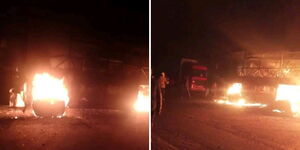The government has so far paid Ksh1.77 billion to victims of wildlife attacks as a result of the recent increase in human-wildlife conflicts.
Wildlife PS Fred Segor revealed that death claims took a huge share of the compensation budget when he toured KWS Training College in Naivasha at the weekend.
The Wildlife department has paid victims from as far back as 2017 and has an allocation of Ksh524 million in the current Financial Year to compensate the remaining lot.
Recent KWS data shows that compensation demands increased fourfold within five years to stand at Ksh569 million in 2019/20 Financial Year compared to Ksh147 million in 2014/15 Financial Year.
Additionally, at least 380 people died and 2,080 got injured after they were attacked by wild animals between 2017 and 2020.
The PS said that 13,125 compensation claims, including 299 death claims, were made at the Ministerial Wildlife Conservation and Compensation Committee (MWCCC) between 2013 and 2017.
He elucidated that those claims attracted a Ksh. 1.48 billion payout while some 129 death claims worth Ksh571 million were postponed because they lacked the required documentations and clarifications of incident accounts.
Prof Segor expressed his dissatisfaction with the sharp rise of human-wildlife conflicts and called upon stakeholders to urgently address this development so as to slash the high costs of compensation that the government incurs.
He decried the increase in attacks by hippos especially near water bodies in Rift Valley in the past few months.
“In the last couple of months, we have seen an increase in cases of hippo attacks mainly around Lake Naivasha and in the process several people have lost their lives,” said the PS.
Prof Segor said the attacks take place in the evenings when the hippos get out of the water to look for food and in the process stray into nearby estates. He urged those staying close to water bodies to be extra careful so as to reduce the attacks and thus prevent more deaths.
There has also been an increase in hippo attacks in areas neighbouring Lake Ol’bollosat in Nyahururu, Laikipia County.
KWS rangers have been searching for lasting solutions to tame the animals and reinstate peaceful human-wildlife coexistence.












